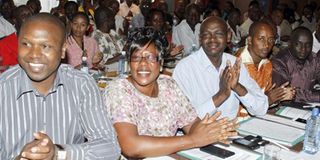Kenyan health workers await deployment to fight Ebola

Some of the health workers who volunteered to join the fight against Ebola in west Africa follow the proceedings during a training session at Panafric Hotel in Nairobi on January 8, 2015. PHOTO | JEFF ANGOTE |
What you need to know:
Over 160 workers left for Sierra Leone and Liberia as part of an African Union mission to contain Ebola in west Africa.
Over 700 applicants had applied for the voluntary mission work, according to the Ministry of Health.
- They will work alongside other volunteer health workers from Nigeria, Uganda and Ethiopia.
Kenya's Health Cabinet James Macharia and his Foreign Affairs counterpart Amina Mohammed are expected to visit the Kenyan teams weeks after they settle down their respective countries.
Mr Macharia said the dates of the visits have not been agreed upon, adding that “reports on the performance of the Kenyan team is very positive.”
Kenyan health workers sent to west Africa to help contain the Ebola scourge are now awaiting deployment to treatment centres after training.
Yesterday, one of the medics told Nation.co.ke how eager and motivated the group is to work in one of the most feared epidemic zones.
“I completed my training on Friday and I'm waiting for deployment any time,” Mr Hannington Odendo, a lab technician, said in a phone interview from Sierra Leone .
Mr Odendo and more than 160 workers left for Sierra Leone and Liberia as part of an African Union mission to contain Ebola in west Africa.
“Sierra Leone is a beautiful country, but it is very hot. So we are adjusting to this and their spicy oily rice. It is a great experience,” said the father of two.
In an earlier email, Mr Odendo said he was in a team that would work to bring down the epidemic.
He left for Sierra Leone on January 9 to work in Ebola treatment units.
PROVIDE CARE
He is among doctors, nurses and other public health workers who will provide care and laboratory services.
The team will be in west Africa for about six months.
More than 700 medics had applied for the voluntary mission work, according to the Ministry of Health.
Mr Odendo said he is working alongside other volunteer health workers from Nigeria, Uganda and Ethiopia.
A health worker who has been in Liberia since November last year but who declined to be named as she is not authorised to speak to the media said they had managed to contain the disease.
Speaking by phone, she said: “Liberians have fought the disease by maintaining cleanliness. Hand washing and chlorinated water are in all areas. Plus efforts of other African countries and donors have stifled the disease. We celebrate when we discharge survivors.”
KENYA AT RISK
The deployments are an effort to fill a shortfall of 5,000 health workers needed, according to the World Bank, to successfully combat the haemorrhagic fever.
Kenya's Health Cabinet James Macharia and his Foreign Affairs counterpart Amina Mohammed are expected to visit the Kenyan teams weeks after they settle down in their respective countries.
Mr Macharia said the dates of the visits have not been agreed upon, adding that “reports on the performance of the Kenyan team are very positive”.
The World Health Organisation (WHO)last year warned Kenya that it was at risk of the viral disease.
Consequently, hundreds of health workers were trained to screen and manage suspected Ebola cases to ensure the disease does not enter the country.
A 40-bed Ebola isolation unit has also been built at Kenyatta National Hospital.
INSTALLED SCANNERS
In addition, on December 3, the government installed thermo scanners at various airports and border points.
The disease has claimed more than 9,000 lives and infected more than 20,000 people, mainly in Sierra Leone, Liberia and Guinea, since the outbreak in Guinea in December 2013, according to WHO.
Reports from west Africa indicate that new Ebola infections are on the wane.
“I am very encouraged to see Ebola transmission rates slowing markedly in Guinea, Liberia, and Sierra Leone, and that other potential outbreaks have been averted because of swift action by other west African governments,” said Jim Yong Kim, President of the World Bank Group.





